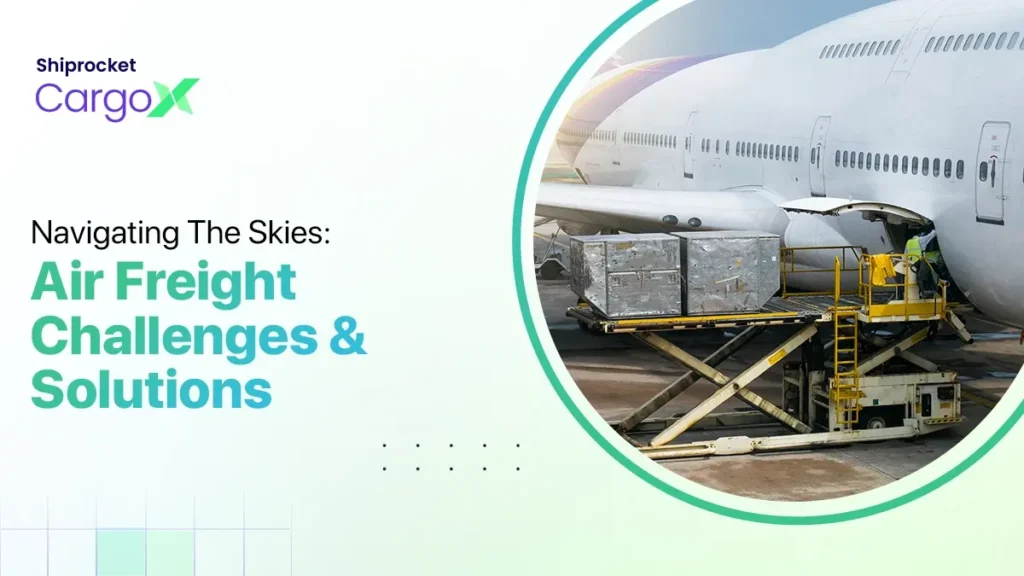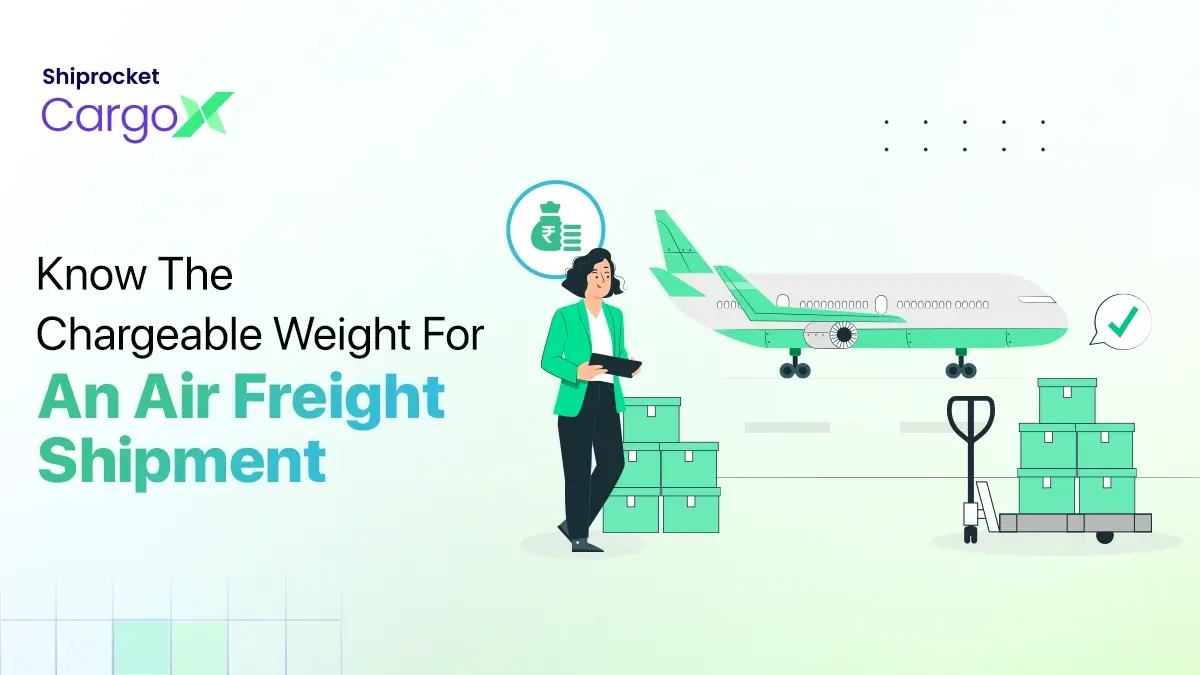Challenges and Solutions in Air Freight Operations
When we think of the fastest and most reliable way of transporting goods, the first solution that comes to mind is airways. Among sea, land, and aerial modes, air transport wins hands down because of the safety measures it takes and the speed it offers. Experts project the global airline market value to rise from USD 553.9 billion in 2022 to USD 735 billion by 2030, growing at a 3.6% CAGR during the forecast period.
Businesses prefer this mode of transport despite the challenges in air freight. But what exactly are these air cargo industry challenges, and how can we overcome them to take advantage of this phenomenal mode of transportation? This article has all the answers to these pressing questions.

Importance Of Air Freight In Global Trade
We would still be struggling with managing global trade operations and transportation if air freight were an alien concept to date. Businesses work and earn profits by providing value to their customers. It would have been a daunting task to fulfill international orders or smoothly run eCommerce stores in the absence of air freight. The wait times for shipping goods by sea or land are exceptionally long, especially for international destinations.
Moreover, transporting high-value, perishable, or time-sensitive products across borders would be nearly impossible without air transport. The potential delays caused by shipping such products through other modes of transport can cause a business to experience significant losses because of the diminished product value. Any damage on the way makes the product unsaleable and jeopardises the company’s image as well in the eyes of the customers. So, companies won’t only lose money but also their reputation and customers. Air freight connects markets globally and enables faster supply chain operations, which makes it indispensable in supporting and facilitating international trade.
Challenges Faced in Air Freight
Is air freight hassle-free? Well! It may be a convenient mode of transportation, but there are still challenges. Businesses may face the following challenges with air freight:
Security of Cargo
The very first dominant challenge in air freight is maintaining the safety of air cargo by implementing top-level security measures. The security at the airports may be applaudable, but it comes at a cost. Incorporating high-end technology and stringent security protocols at every step of air transport takes a hefty investment. The cargo undergoes screenings, tests, and much more before onboarding the aircraft, during the transit, and after landing. Air freight services are also supposed to use tamper-evident seals, conduct thorough background checks on employees, and employ secure facilities and equipment to facilitate the air transfer with utmost caution and save the products from potential tampering or theft. All this requires the extremely important two ‘Ms’: Manpower and Money.
Customs Clearance Procedures
Another stifling air cargo industry challenge begins with handling the extensive paperwork at the customs and following the import/export regulations and policies in different countries. Importers and exporters find themselves buried under heaps of customs clearance forms and other paperwork while attempting to ship goods cross-borders. The pain doesn’t end here; they also need to be well-informed about the EXIM rules, regulations, and policies to avoid any problems or delays in the process. Any kind of delay in shipment can easily put businesses in a difficult situation, causing shipment hold-ups, increasing costs, and leaving their customers disappointed.
Capacity Limitations of Aircraft
There’s a limited capacity and potential weight restrictions for cargo in aircraft, which adds to the challenges in air freight. Air carriers find this cargo space either in passenger flights or use cargo planes designed to carry air cargo, to stash the goods and transport them. In both cases, the capacity may not suffice for very large or heavy shipments. The possible reasons for air freight space limitation are aircraft unavailability, peak/holiday seasons, and fluctuating market conditions. Consequently, the shortage of air cargo space can spike air freight rates. This will create a challenge for businesses and make it difficult to keep customers happy by fulfilling their demands.
Compliance to Regulations
It’s a task to match the industry standards and comply with respective regulations in air freight. Importers and exporters must keep an eye on air freight regulations regarding hazardous materials, dangerous goods handling, restricted goods, and other customs requirements that frequently change. Non-compliance would mean facing unavoidable challenges in air freight and having shipments delayed or cancelled.
Solutions: Overcoming Air Freight Hurdles
We have some creative solutions to all these challenges in air freight. To start with, a productive way to dilute the risks and swerve the challenges in air freight is collaborating with a freight forwarder company that has in-depth knowledge and the expertise to handle air freight.
Companies need to incorporate advanced security protocols to overcome the security challenges in transporting air cargo. Sometimes, they may be unable to do it properly due to a lack of knowledge, expertise, or funds. However, experienced freight forwarder companies have state-of-the-art security technology in place. They also train their staff well to handle any risks associated with theft or tampering of air cargo.
The leading freight forwarder companies also know how to use data analytics to predict demand and adjust the capacity of the air carrier accordingly. They can make space or utilise the available space in the aircraft while reducing any potential bottlenecks. Businesses can also opt to handle this operation on their own by making strategic alliances with various airlines to get more capacity, plan shipments in advance, and have flexible flight schedules. However, collaborating with a freight forwarder company can be more beneficial since these firms already have such relationships established with many airlines. This can give you the advantage of preferential booking and high-priority space allotment.
When it comes to customs clearance and intensive paperwork, the teams at freight forwarder companies have profound knowledge for handling these formalities quickly. Since it’s their daily job, these custom brokers deeply understand the customs duty regulations and maintain relationships with customs authorities. Many proficient customs brokers may also use automated systems, like the EDI (electronic data interchange), to expedite your customs clearance process.
Beating the challenge of regulatory compliance in air freight takes much effort on the part of a business. This includes staying informed about the regulations, maintaining proper records, investing in training employees, meeting legal requirements, and taking strong quality control measures. A business can choose to adopt all these relevant measures or tie up with an experienced freight forwarder company that has full control over regulatory compliance and the knowledge to execute it.
CargoX is a dependable logistics service that offers you excellent air freight solutions and extraordinary service. They equip their team to handle all possible air cargo industry challenges to let their customers focus on other business operations while they manage air freight for them. The cost-effective and efficient suite of services CargoX offers provides you with a hassle-free experience.
Future Outlook For The Air Freight Industry
The future of air freight looks promising with new eCommerce businesses entering the market more often and global trade increasing significantly. There are over 19,000 eCommerce businesses in India currently, and this number will only increase with the rising trend of online shopping. Moreover, Industry experts project the Indian D2C market to reach a whopping USD 60 billion by 2027 and eCommerce to reach nearly USD 350 billion by 2030.
Technological advancements in air freight will also raise its performance a notch higher. Air freight logistics are likely to witness innovations in logistics technology, like blockchain for transparency and the use of drones for last-mile delivery. The air cargo industry is also joining the sustainability race to overcome the challenge of carbon emissions. The aviation industry is coming up with fuel-efficient aircraft and more to make air transport eco-friendly and reduce its carbon footprint.
The digital transformation will also have a profound effect on the air freight industry, as booking, tracking, and handling air cargo operations will happen through digital platforms. It will make the processes transparent and bring more efficiency to the supply chain. IATA has initiated many projects, like eAWB, Interactive Cargo, Cargo Connect, and more, to enhance digitalisation in the air freight sector.
The various trade agreements and geopolitical changes will affect the global trade routes in the future. Moreover, with the evolution of this industry, India is likely to emerge as a connecting hub between many regions. The ICAO‘s Council is aiming to minimise direct interactions among transportation experts and international trade in the coming years. This initiative will reduce the constraints and create a smooth flow of international trade and worldwide transportation activities.
Conclusion
To conclude, air freight operations take a lot of work because of the complexities involved. Supply Chain managers face strategic and operational challenges in air freight very often. Many diverse factors like customs rules, less preparation time, high-level security, nation-specific government regulations, limited aircraft space, and product restrictions make dealing with air freight cumbersome and challenging.
You need expertise, an extensive network, and the right approach to overcome these hurdles and ship your cargo effortlessly via air. So, latching your business with a freight forwarder company is the most sorted way forward.




